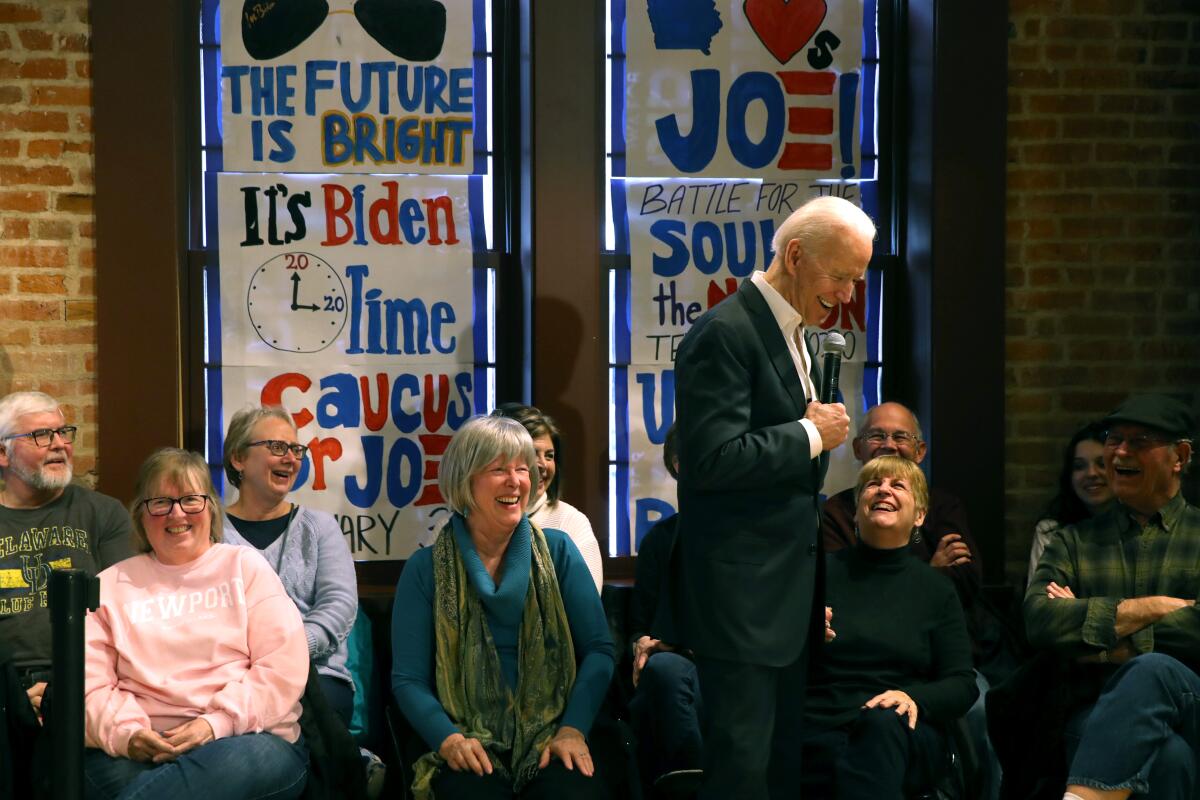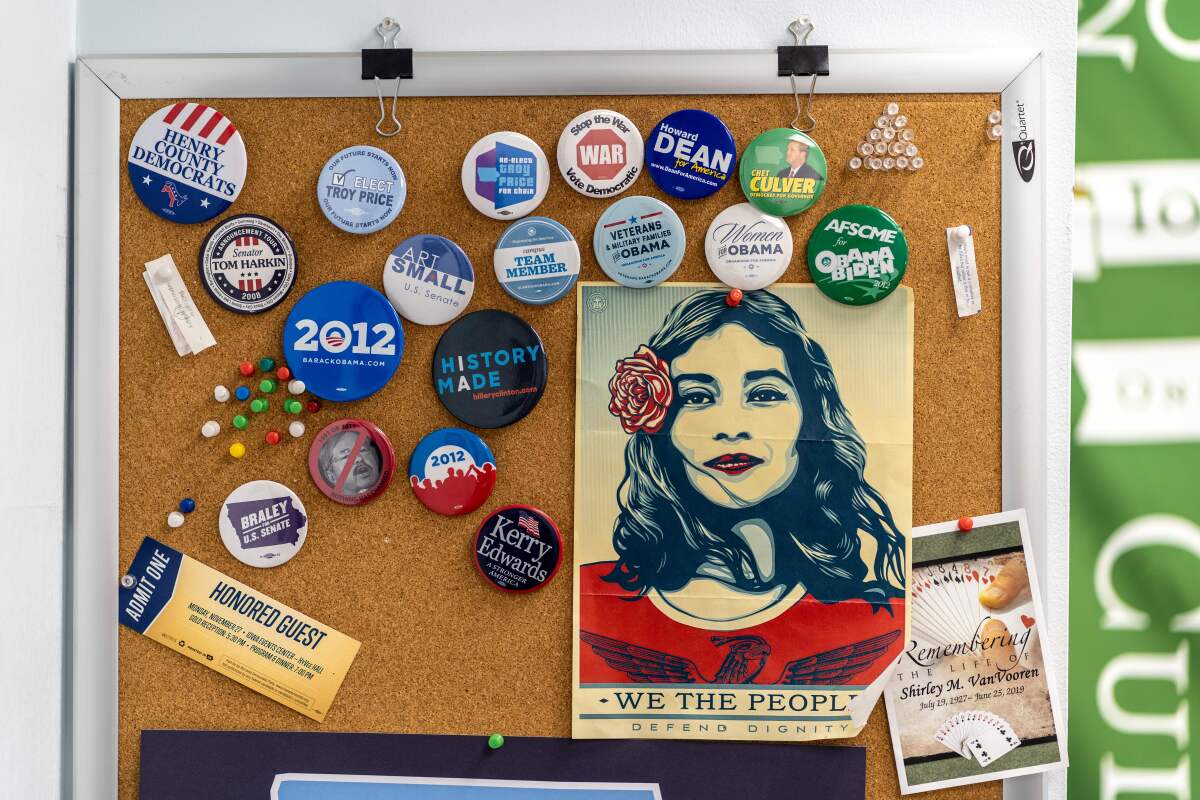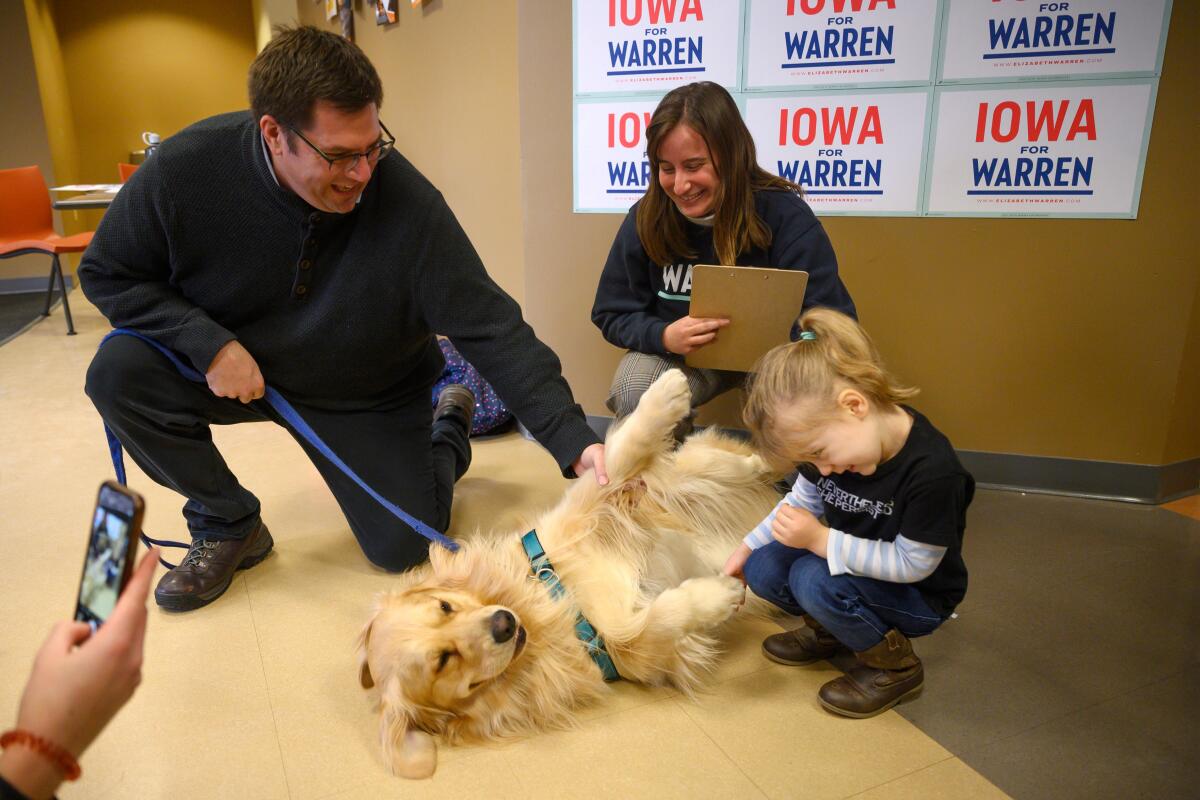‘It’s overwhelming’: For Iowa Democrats, there’s nowhere to hide from this presidential campaign

- Share via
AMES, Iowa — Democracy. It’s a blessing and a burden, Iowans can tell you.
Ellen Thornwall’s eyes widened as she described what it was like to move from Colorado to Iowa in June, with the Democratic presidential primary already in full swing. She now gets half a dozen calls from phone-bankers a night and sees only political advertisements on TV.
“We don’t have these things in Colorado,” Thornwall, a 64-year-old retiree from Slater, a small town north of Des Moines, said as she stood in line for a Pete Buttigieg campaign rally in the nearby college town of Ames. “It’s overwhelming.”
With the Democratic campaign moving into the closing days before the first-in-the-nation contest in this state Monday — where a big victory could propel a candidate toward securing the nomination — some Iowa Democrats are a little worn out from being, well, all-important.

Proliferating digital technology and volcanoes of cash have helped presidential campaigns saturate the Hawkeye State with canvassers, phone-bankers, text messages, mailers, TV ads, radio ads, digital ads and, of course, the candidates themselves.
Throw in a highly competitive race among four or five candidates, and there are now more campaigns with more money trying to reach more voters through more avenues than have ever been possible before — and all this in a modestly populated state.
“It’s much more intense than I’ve ever witnessed,” said David Nagle, a former Iowa Democratic congressman and party chair, who expects record turnout for the caucuses.
Not long before former Rep. John Delaney of Maryland dropped out of the race Friday, Nagle said his wife had just gotten a call from his presidential campaign to ask for her support, with the caller asking, “Would it help make up her mind if John personally called her?”
(They don’t run elections in California like this.)
As a party official who’s been in the tough business of winning races, Nagle was not sympathetic to complaints that locals were getting too informed about their government.

“I don’t care if they’re tired of it. Democracy is hard,” Nagle said. “Dammit, this is probably the best and purest form of representative government that we have in this country,” he added, referring to Iowa’s system, which culminates with hours-long neighborhood caucuses.
Whichever form of democracy this is, it involves a lot of emailing. Jackie DeMolee, 36, who works in higher education in Iowa City, set up a special inbox that automatically snags political messages.
“I have received over 3,100 campaign-related emails since my first emails in March,” DeMolee said. “I’ve gotten six emails today.”
There are the text messages, one of the newer campaign weapons unleashed on Iowans.
“The texting wasn’t a big deal before,” said Liz Goodman, 61, who owns a small wine distribution company in Iowa City and has been around Iowa for several caucus cycles.
Goodman gets about five campaign text messages a day on her cellphone, she says, along with a more familiar battery of phone-bankers and pollsters calling her landline.
“The texting is” — Goodman paused for three seconds — “annoying.”
Then there are the door-to-door canvassers. Christine Hopkins, 29, a freelance sportswriter in Des Moines, has taken to sitting by her front window to see the canvassers coming — to avoid them. She gets about three or four of those visitors a week.
She’s seen enough canvassers that she can usually identify their campaign from a distance. The youngest are often with Sen. Bernie Sanders. Buttigieg’s supporters often wear his campaign’s distinctive yellow. Hopkins respects their hustle, but personally she’s a little over it.
“I know that Iowans are notorious late deciders, but most of us have decided by now. Or, at least, decided who we don’t like,” Hopkins said.
“The thrill of going to a random Michael Bennet or John Hickenlooper event because they happen to be in town just isn’t there anymore,” she said, referring to the Colorado senator and that state’s former governor, who dropped out of the race in August.
Nonpolitical ads on television have become rare enough to serve as an attraction.
On Thursday, an ad aired in Des Moines that featured images of flowers, pools and waterfalls and soothing music. A woman’s voice ended the ad, saying: “This break in political advertising is brought to you by the Des Moines home and garden show.”
The radio has also been conquered and occupied by campaign messages. Candidates now advertise as well on digital platforms such as Facebook and Spotify.
“Every commercial right now,” said Wendy Tjelmeland, 60, a Nevada, Iowa, retiree. “I mean — every commercial. ... We’re all seriously looking forward to next Monday, because the commercials will cease.”
Jon Green, 37, an IT systems engineer from Lone Tree, in the eastern part of the state, extensively uses ad blockers and doesn’t own a TV, meaning he lives in an almost totally advertisement-free environment by comparison. Very zen.
The few ads Green does see mostly make sense to him, since they tend to be from the most popular candidates — “with the exception of Steyer, who continues to carpet-bomb us all.”
Ah, Tom Steyer. The billionaire activist who is self-funding his campaign has unleashed an avalanche of advertising on multiple fronts. It’s what he’s known for.
To Iowans not already familiar with him from the airwaves, Steyer has become a veritable mailbox hobbit, reliably found dwelling inside when residents check for the day’s deliveries.
“Tom is my pen pal now,” Susan Nelson of Marble Rock wrote in a sardonic tweet showing off some of her Steyer mail. “I hear from him almost every day.”
Emily Brunner, a 46-year-old academic advisor in Iowa City, is saving Steyer’s mailers for a mysterious art project that a friend wants to do. At least they’re finding a home other than the waste bin.
“He’s probably destroyed entire forests to make the mailers he’s sent me,” Brunner said. (Let’s also not forget the locust swarms of journalists roving the state. Before speaking with The Times, Brunner called herself “the last adult Iowan who hadn’t been interviewed about the caucuses.”)
Jeff Link, a longtime Democratic strategist based in Des Moines, said campaigns would rather risk going a little overboard with burned-out voters than miss out on a prospective supporter.
“I do think it’s going to contribute to a higher turnout,” Link said.
Still, a little fatigue is inevitable.
At a Buttigieg event in Ames on Wednesday, one voter, given a chance to ask Buttigieg a question, recalled that she had gotten a phone call from another campaign recently asking her to attend an event to listen to a candidate’s pitch.
“I’m done listening,” the woman, Lynn Marr-Moore, a retired journalist, told Buttigieg. “I want someone to listen to me.” She said she was a Type 1 diabetic whose copays were $1,000 a month, and she wanted to know what Buttigieg was going to do about it.
“Help is on the way,” Buttigieg said.
Healthcare policy is one of those deeply nuanced, life-and-death policy issues on which the candidates have substantive differences.
But for all the textured choices Iowans have been presented with, most Democrats here have few illusions about the amount of deliberation that will be necessary when choosing between whomever becomes the Democratic nominee and President Trump in November.
As one Ames woman put it to Buttigieg: “I would vote for a potato.”
Times staff writer Seema Mehta in Des Moines contributed to this report.
More to Read
Get the L.A. Times Politics newsletter
Deeply reported insights into legislation, politics and policy from Sacramento, Washington and beyond. In your inbox twice per week.
You may occasionally receive promotional content from the Los Angeles Times.











